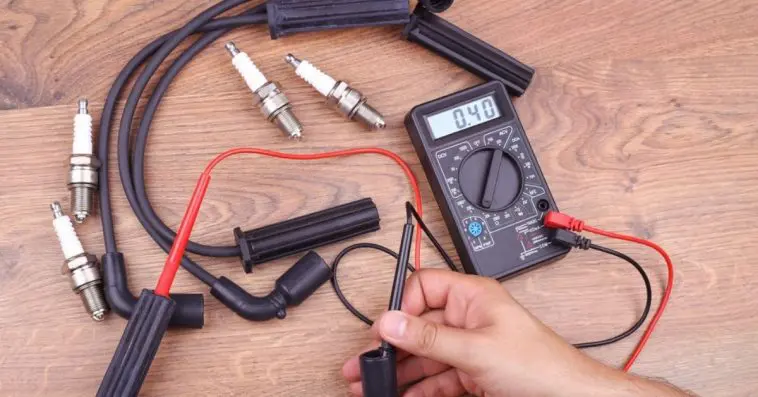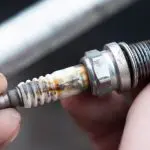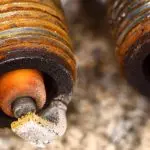The spark plugs play a vital role in the engine of the car and that is why they need to be in good condition for the optimal performance of the engine.
This might cause the engine to have some complications such as misfiring or having a poor reaction when you step on the gas pedal when accelerating.
As such you will need to check the condition of the spark plugs and change them if they are in poor condition.
Here’s how you can check your spark plugs through any of the following ways:
- Check The Tip Of The Plug And The Side Electrode
- Check The Plugs Wiring
- Check For Detonation Damage
- Look Out For Pre-Ignition
- Check The Sparks
When you check the spark plugs regularly, then you will be guaranteed a quality time with yours. This will also guarantee that your vehicle will have an efficient fuel consumption.
TABLE OF CONTENTS
How To Tell If Your Spark Plugs Are Bad?
You can check the condition of your spark plugs through either of the following ways.
1. Check The Tip Of The Plug And The Side Electrode
If you notice that either the tip of the spark plug or the side electrodes turn to a dark color, it may be because they are exposed to too much fuel.
This might also arise from having injectors that are leaky or that the wiring is done in an inappropriate manner.
Generally, this is an issue that arises from working with a spark plug that is in the car engine.
2. Check The Plugs Wiring
You can get a digital multimeter to measure the resistance of each of the spark plug wires.
The resistance should be in the range of 10000 ohms and 15000 ohms. If it is above that then the wiring may be poorly done.
3. Check For Detonation Damage
This can cause the engine timing to off balance. The detonation as well as using a gasoline that does not have the required octane rating might be the cause of this.
4. Look Out For Pre-Ignition
If you check the side electrode is burnt, then this might cause the plug to misfire.
Pre-ignition here occurs because the plug you are using fires too early and this does not give the spark enough time for the fuel to get to the combustion chamber for the combustion of the air and fuel mixture.
5. Check The Sparks
You can physically have a look at the sparks for any signs that will show that it is damaged.
If they have changed in color such that they appear blackish then they might not be in a capacity to do their work. The dark color usually arises from carbon deposits or oil deposits.
How To Test Spark Plugs
You can test the spark plug you have without taking it to your mechanic through the following steps.
1. Disconnect The Spark Plug Wires
- When the engine is running, disconnect the spark plug wires one after the other from the car engine.
- If you notice that the vehicle is dropping in speed or that it is moving in a rough manner when a single spark plug wire is disconnected, then the spark plug is disconnected.
When you do not notice any change in the way the car engine is working, then the spark plug is bad.
2. Test The Spark Plug Ignition
- Disconnect the spark plug wire from the spark plug.
- Touch the point of the spark plug wire near a metal surface.
- A good spark plug will provide a spark or you will hear a crackling noise.
- The spark and crackling noise will show that there is voltage going through the spark plug wire to the plug itself.
3. Check For A Spark On The Spark Plugs
- When the engine is cranked, you can check if there is a spark on every spark plug wire.
- The spark will occur if the compression is excellent and this will be caused on the spark plug cylinders.
- A dead spark plug will not provide any spark.
4. Ensure That Each Link That Is Attached To Your Spark Plug Is Hooked Up Appropriately
The links that need to be securely hooked up include the battery cable, ignition and coil wires.
5. Wiggle The Connections Of The Link As They Are On The Spark Plugs
Repeat the test which should be successful. As in some cases, a loose connection might provide wrong results.
6. Clean Spark Plugs
You will need to clean the spark plugs thoroughly as they might give wrong results when they are oiled or covered with carbon deposits.
If the tests are not favorable, then you will be forced to replace them altogether.
One of my articles can help you how to clean your spark plugs.
How To Test A Spark Plug With A Multimeter
The multimeter can be used to test the condition of the spark plugs by checking on the rating of their resistance.
You can determine this through the following steps:
- Set the multimeter at 20000 ohms.
- Place the test tips on either ends of the spark plugs.
- You need to clean the spark plugs and get rid of the carbon fouling and the oil deposits.
- The reading should not be significantly higher than 15000 ohms.
For more details, you can watch this video:
FAQs
You now know how to check your spark plugs either you will have to replace them or not.
I have listed some questions according to checking spark plugs. And they are sought by many people who also looked for the same topic as you did below.
Q1. What Do Bad Spark Plugs Look Like? And What Will Happen?
When you take out the spark plug installed in your car engine and notice that it appears ashy and too dark, then it might be bad.
This might be because of the carbon and oil deposits which will prevent it from working appropriately.
However, this may not be the case as the spark plugs may still have a couple of miles to go.
The appearance of the spark plugs may not always show that it is a bad one, and you may have to wait for other signs to determine this.
You will be able to figure out if the spark plug is bad if you notice any of the following:
1. Poor Gas Efficiency
If you have to fill the gas of your vehicle too often, then the spark plug might be a bad one. This is because one role of the spark plug is to ensure a better efficiency in gas consumption by the car.
When a spark is in good condition, it should be able to spark a higher percentage of fuel when it is igniting the air and fuel mixture.
However, there might be a case of incomplete combustion as in the case if your spark plug is a bad one.
This happens and most of the gas in your car is not ignited rather it will be wasted. It then gets disposed by being blown out of the exhaust pipe.
As such, to avoid spending too much on the gas of your vehicle, the spark plug is one factor that you should ensure is in good condition.
This will also prevent the other components that are associated with the spark plug from being damaged.
2. Poor Engine Reaction
A bad spark plug may lead to the engine losing its power.
This is because the spark plug will not be igniting the maximum amount of gas as needed causing the engine to be unable to generate as much power as needed.
An engine that is unable to generate as much power as possible due to a poor spark plug can be noticed in the acceleration.
If the vehicle will showcase a rather slow or sluggish acceleration, then the issue might be that the spark plug is bad.
The engine may be misfiring when you press the gas pedal on your vehicle.
You will realize this when it often skips a beat or even you will be able to hear loud “bang” sounds. This might be the case of the engine misfiring.
When the car engine is not idling as well as it is before, then the issue might be with the spark plugs. You may hear rough sounds or even loud vibrations that were not there on normal occasions.
3. Blue Smoke Removed From The Exhaust Pipe
This might not be a reason that it is too late as it only signifies that they are getting worse. If you notice any blue smoke coming out of the exhaust pipe.
The blue engine is not an exact reaction that arises from the spark plug being in bad condition. It usually arises from there being too much oil in the engine’s cylinder.
This forms deposits to form on the spark plug and thus they are unable to work well. They may begin producing weak sparks.
You may need to replace the piston rings or the valve guides. This is what is letting the oil escape into the combustion chamber and accessing the spark plugs.
4. When It Fails Emissions Tests
When you test your car for emissions and it fails the tests, then the issue might be with the spark plugs.
A vehicle fails its emulsion tests if it is found to emit fairly large amounts of Hydrocarbon Emission.
As indicated earlier, a spark plug that is in poor condition may experience incomplete combustion due to not igniting the maximum amount of gas as needed.
This then sends raw fuel out of the exhaust pipe of the vehicle.
5. Experiencing Poor Starting Of The Car
When the spark plugs are in poor condition, they may not be able to produce the required spark.
This will cause poor combustion that will be needed to get the engine running and thus the vehicle will not be able to start as smoothly as before.
Q2. Can Bad Spark Plugs Cause Knocking?
Yes, a bad choice of spark plug connected in your vehicle’s engine may cause knocking of the car.
When you install a type of spark plug other than what is advised by the manufacturer of the car, this causes some complications it may cause complications that will lead to you hearing knocking sounds.
Such sounds are produced when the car is running.
What you should know is that different types of spark plugs are designed to be suitable for working in specific types of engines.
This is because the combustion chambers of the various engine designs work within a specific heat range.
Spark plugs can withstand heat within a specific range, beyond which they will be unable to work well.
Similarly, the gap on the spark plug should be well verified before installation to prevent the knocking sound.
If the gap is either too narrow or too wide the spark plug would not be able to produce the required spark that will be effective in the engine’s combustion chamber.
A gap that is rather too narrow will create a spark that is not strong enough, while a wider one than needed may not even produce a spark at all, leading to misfire.
This may be the source of the knocking sound you hear from your car’s engine.
If your spark plug is the appropriate type and the gap is of the correct size, then it might not be the one causing the knocking sounds.
The issue might be that you fueled the car with fuel that has a rather too lower rating than what is needed for your vehicle.
Carbon deposits may also be too much and hence the production of the knocking sounds.
Conclusion
All in all, you now understand the reason when you need to check the condition of your spark plugs whenever you get the chance to.
This will determine the performance of the engine in your vehicle and will also protect other components of your vehicle engine from being damaged from working with a spark plug that is in poor condition.
When you realize that the issue is with the spark plug then you will have to replace it as soon as you can to be able to work with your engine at its peak performance.
You can read this article to find out the top 10 best spark plugs!
Source:




